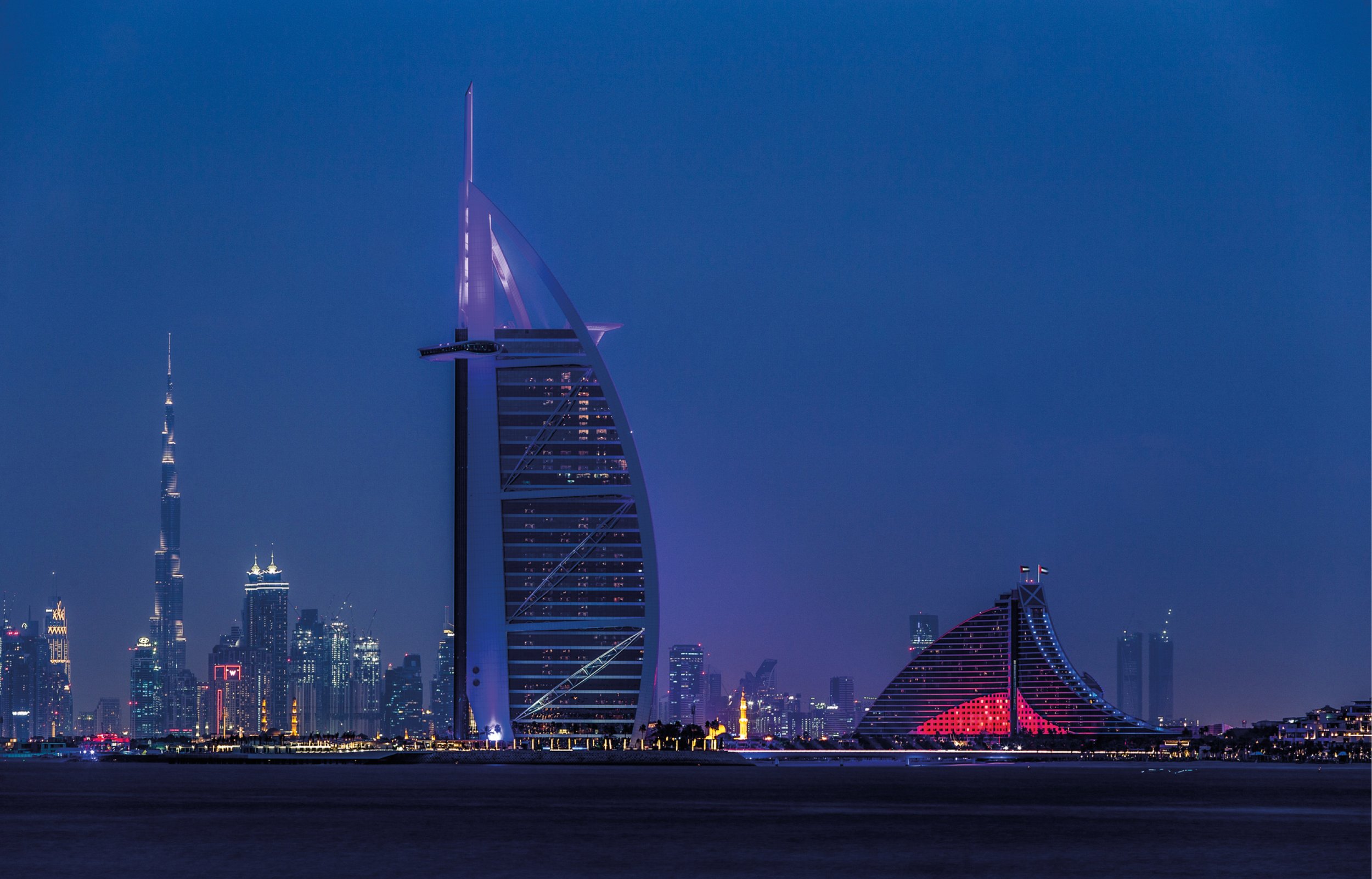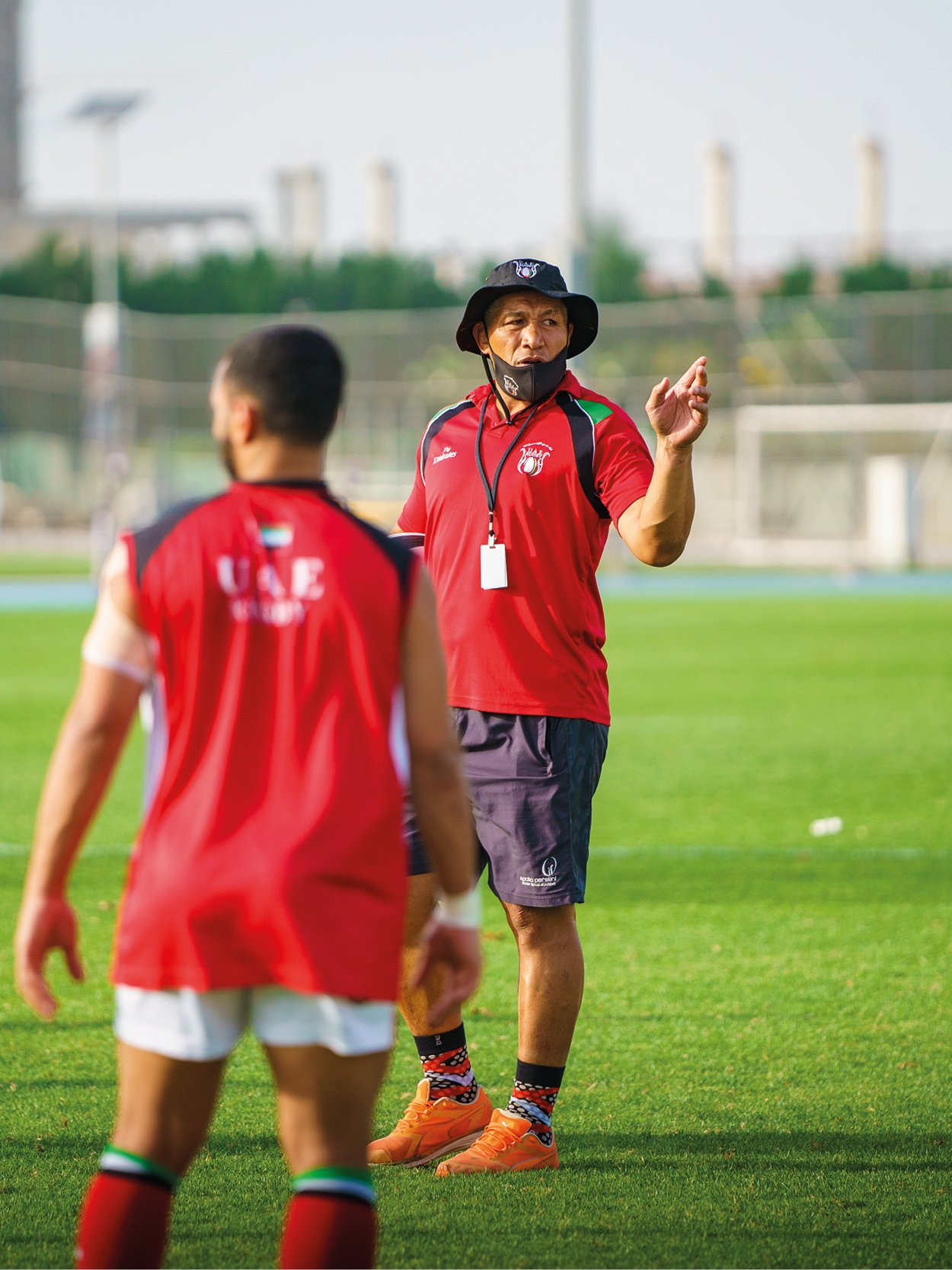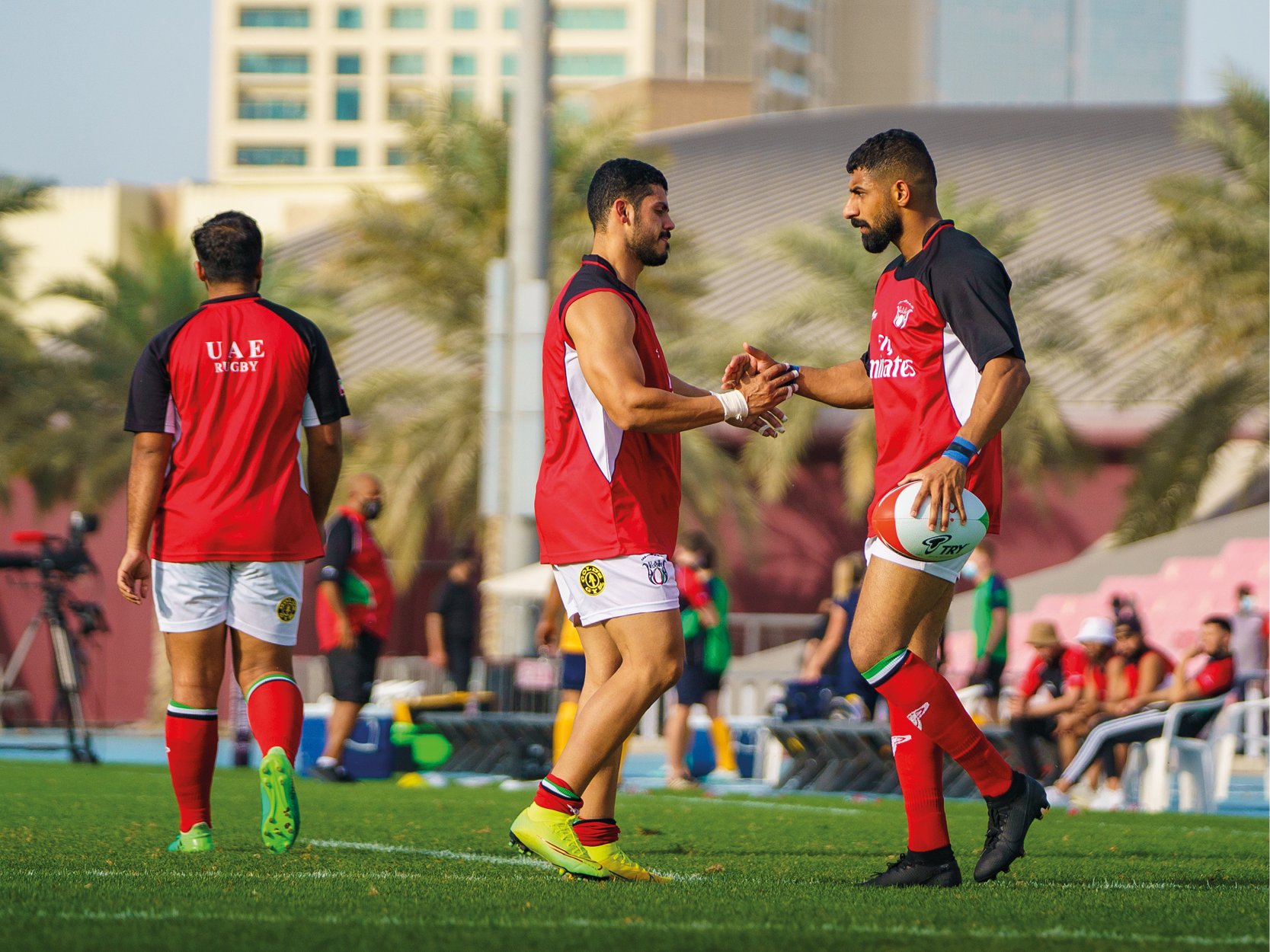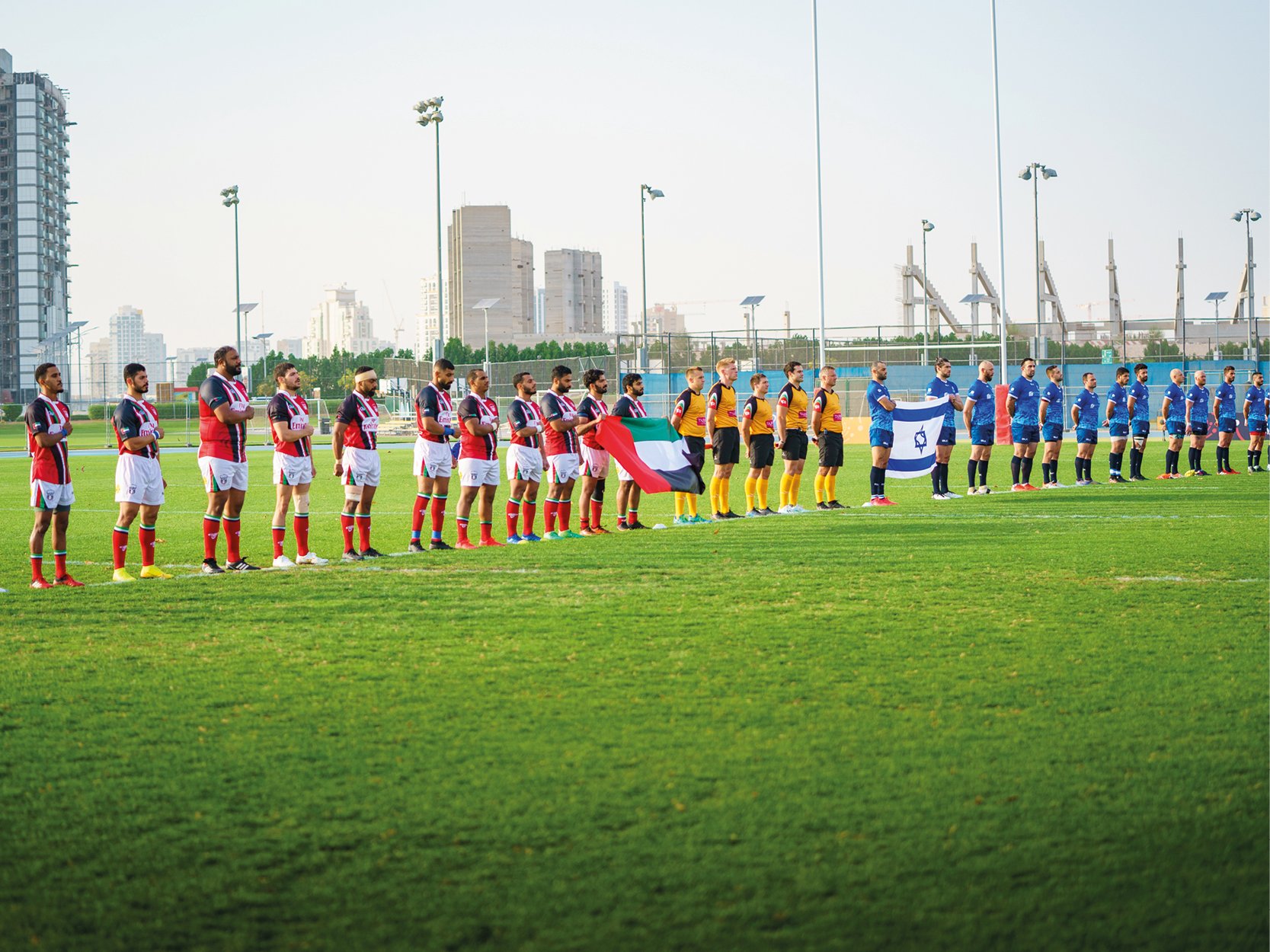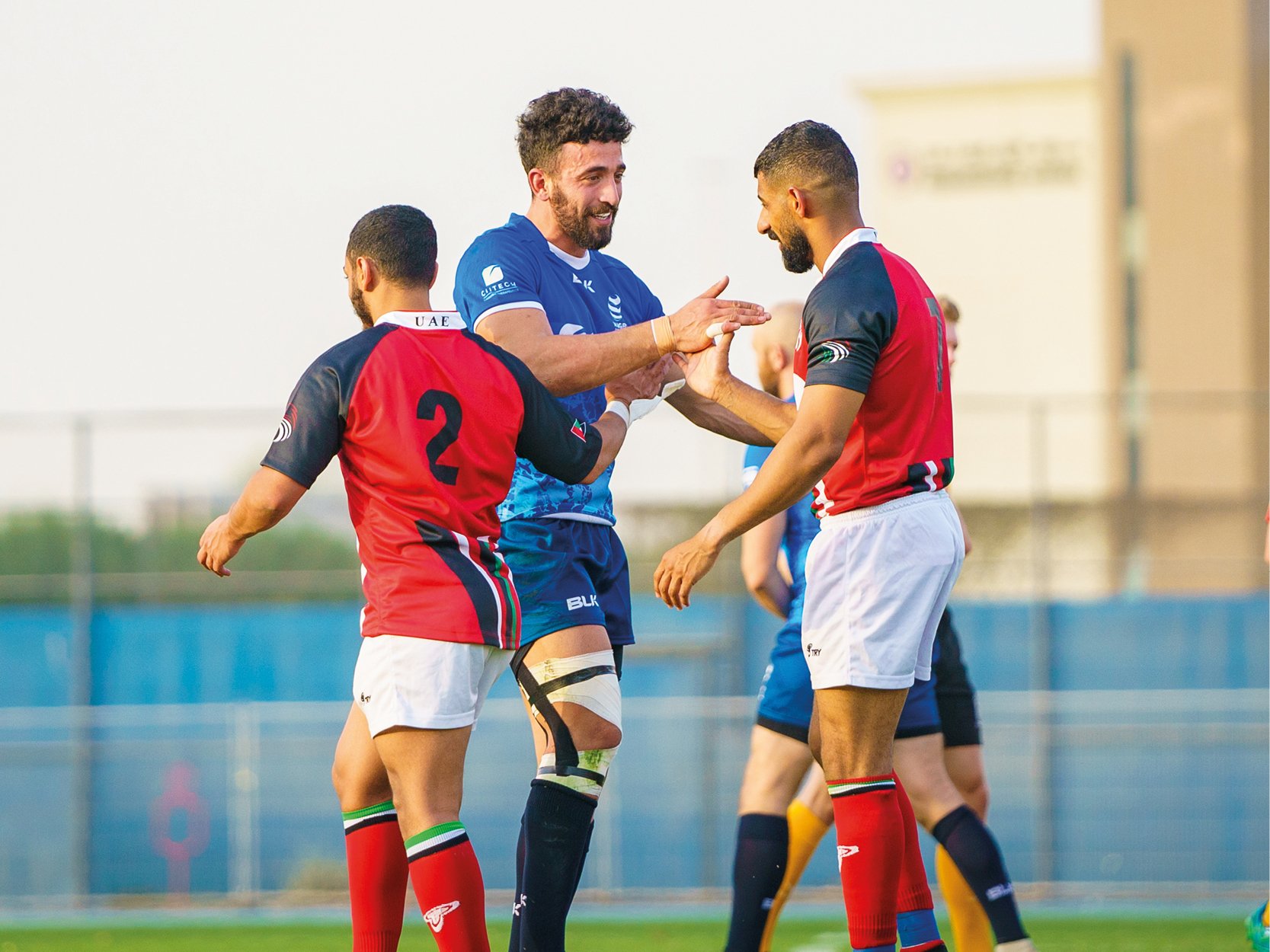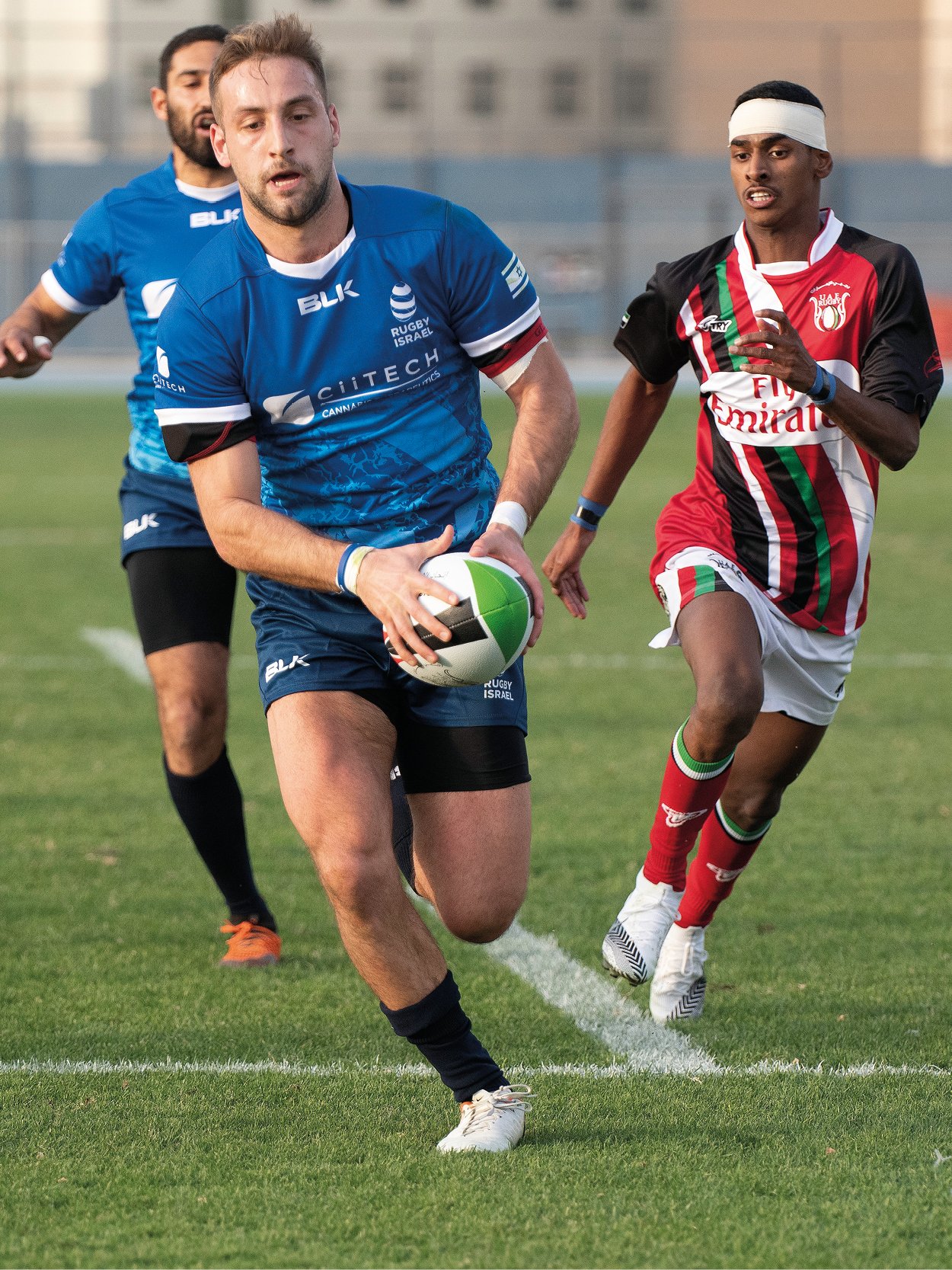Apollo Perelini
Less than a year after signing a peace agreement, the United Arab Emirates and Israel met for a rugby match, the first sporting event between the two. At the heart of it, is a man famed for hospitalising three Welshmen and laying waste to a nation’s hopes thirty years ago. Apollo Perelini, aka The Terminator, is the most unlikely of peacekeepers.
The week of the global financial crisis doesn’t seem to be the best time for an expat to be arriving in the UAE, but in September 2008, Apollo and Selina Perelini, together with their two young sons, Caleb and Noah, did exactly that. “A huge surge of people were doing the opposite to us,” explains Apollo. “A huge amount of diplomats, businessmen and even wealthy locals basically decided that the global economic crisis was forcing them to return to their countries of origin and rethink their future.”
Walking apprehensively toward the border checkpoint, Selina looked at Caleb and Noah and, for a moment, froze and asked Apollo: “Are you sure this is a good idea?”
“Yes, Selina,” he responded. “We’re staying. I do not know why, but I have a good feeling about this.”
“At that moment,” says Selina, who’s joined us for the chat, “I thought to myself: ‘Wow this better be good, because if not, well, there’s going to be a problem here.’”
Selina’s caution was understandable. After all, Apollo had spent the previous four years on the coaching team at his former club St Helens in rugby league, helping them to four Challenge Cups, four Super League titles and a World Club Championship. He was in demand, the table was full of offers, and he was opting not for a hotbed of rugby league or union, but Dubai, taking up the role of a director of sport at Repton School Dubai. “At that time Apollo finished four magical years of training at St Helens,” explains Selina. “Quite a few clubs courted him, and I imagined the real dilemma would be whether to continue coaching in rugby league or find a team in rugby union.
“Who even thought of going to Dubai? Where is it anyway?”
The credentials of Apollo – named after Apollo 11, having been born in the month of the moon landing – are impeccable, in both codes. Born in Auckland, his career began in union as a back-rower with Auckland and North Harbour, he earned honours with New Zealand Under-21s, before making his debut for Samoa, and appearing in their iconic 1991 Rugby World Cup campaign. A move to England took him to rugby league and St Helens, where he’d play almost 200 games, winning Challenge Cups, Super Leagues and World Club Championships along the way. Another World Cup, this time the rugby league variant, again for Samoa, followed in 1995 – the first Samoan to appear in both codes’ showcase event.
His playing career ended in union with Sale, helping to lay the foundations of the side that would win their first – and so far only – Premiership title in 2006.
As Selina explains her surprise at her husband’s career decision, Apollo listens with a broad smile, as we talk in the offices of the Rugby Union of the United Arab Emirates.
In addition to being head coach of the UAE National Rugby team, a role he’s had since 2015, he also runs two sporting academies – Apollo Perelini Rugby Skills Academy and JETS (a female football academy), at an increasing number of venues around the emirate. “But when I think about it now I really cannot understand what the hell went through my mind,” he says, thinking back to that initial decision. “Today I’m not sure I would have the courage to take such a bold and dangerous step. But probably when you are young and curious nothing can scare you or stop you.”
Apollo’s office is full of what you’d expect from a national coach: computer screens, big televisions, and neat binders on the shelves with data about his players, advantages, disadvantages and notes for improvement. It’s only when you see the view from the office of the Dubai city skyline that you realise the change he’s made; this is not the north of England. “It’s a bit reminiscent of the story of the Wizard of Oz,” he says. “A tornado uprooted me and my foundations and this time brought me to another dimension.
“Dubai says there are two types of people in the world, some who can’t stand the desert landscape and others who can’t do without it. I didn’t really understand that idea at first, but in recent years I seem to agree. It’s probably because I’m getting closer to the other type of people.”
Apollo has come a long way since his Auckland days, and so too has his new home, Dubai. It’s hard to think of it as the small fishing village it once was – a description that would still have fitted only five decades ago. Trade was also important, with its proximity to routes to India forming it into something of a business centre for merchants across the region. But it was the discovery of oil in 1966 that changed it forever.
Foreign workers from all over the world filled this tiny entity and led to the establishment of the world’s largest port and the declaration of Dubai as a free trade area.
In 1971, Dubai merged with six other monarchical emirates into one country, the United Arab Emirates and, today, only 1.4million of its 9.9million residents are citizens of the state, with the rest made up of expats. “I think that figure is exactly the magic secret of the place,” says Apollo. “Despite the insane distance from home, the residents of the UAE have never made me and my family feel lonely. There is a rare cosmopolitanism here.
“People from so many different countries and places around the world all manage to adapt to the local mentality: hospitality, respect, honesty. I like this. Although I am so far from where I was born and left more than 30 years ago, Dubai has what my family and I have been looking for all along. Home.”
There’s a knock on the door, it’s his assistant coach, Yousuf Shaker. We’re talking in the build-up to the historic rugby match against Israel, the first time the two nations have met in competitive sport and Yousef has come to deliver training and injury updates. “We’ve been working together for a number of years and for me it’s just a dream come true to work with a true rugby legend,” says Yousuf. “It’s hard for me to explain to you how much Mr. Perelini is valued here. He actually reinvented the game for the UAE.
“I never dreamed I would fall in love so much with a sport that is not football, but, thanks to Coach Apollo, that miracle happened. He does not tell us much about himself but with him the deeds speak.
“When he spurs the players and teaches them new exercises, he always says they still do not understand how huge their potential is. And we believe him. Both the coaching staff and the players. You do not understand how much we have improved thanks to him.”
It’s not just to Yousef that Apollo is a legend. His name is writ large in rugby union folklore, not least for the way he dismantled the Wales side in the 1991 Rugby World Cup, causing one of the greatest, if not the greatest, upset in the sport’s history – with only Japan’s win over South Africa in 2015 running it close.
Going into the World Cup, Apollo had made just two appearances for his country, both coming earlier that year – a 41-13 rout of Tonga at blindside and a 40-23 defeat of Fiji, this time from number eight.
The next game was very different gravy. Against Wales at a Rugby World Cup, in front of 45,000 at the old Arms Park. He was barely 22 years old and not one of the 45,000 gave his side a chance. Significantly, he’d now moved to openside, not only completing a set of back row caps, but also putting himself in prime position to demolish Welsh hopes in the most physical way he knew. “When we beat Wales in the 1991 World Cup it was the highlight of my rugby union career,” he recalls. “To win 16-13, at the Arms Park, such an iconic stadium, in front of all those Welsh fans, made it really special.”
Three Welsh forwards – Richie Collins, Phil May and Tony Clement – required hospital treatment after being on the receiving end of Apollo tackles, all perfectly legal, earning him the nickname: The Terminator. “It was just the force of the collision that did the damage,” he says. “Scott Gibbs played that day and loves to try and wind me up by saying there was nothing accidental about it, but I can honestly say I have never intentionally set out to hurt anyone on the rugby field.”
That game also established the status of Apollo, along with the rest of his team-mates, including the likes of Brian Lima, Pat Lam, Stephen Bachop and Frank Bunce, as a true cultural hero in his homeland. More importantly for Apollo, it was the first time his parents were really proud of him. “The acknowledgment of the crowd for what we achieved flowed all the way through the Pacific Islands and everyone felt proud to be Samoans,” he says. “Before then, no one knew where Western Samoa [the name under which Samoa then played] was.
“My parents just said, ‘well done, good on ya’ to me when I was selected to play for New Zealand U21s – alongside Martin Johnson – it wasn’t really that much of a big deal to them but representing Samoa at a Rugby World Cup, that made them so, so proud.”
It also led to another offspring being given an unusual name. “Our centre and try-scorer, To’o Vaega, named his eldest son, Cardiff,” laughs Apollo. “Once the tournament was over, we returned to New Zealand and had a big reception there. Then the Samoan government paid for all our families and girlfriends and wives to be flown over to Samoa for a week-long celebration. We’d done more for the country in terms of putting it on the map that any ambassador could do in a hundred years.”
In the mid 1990s he made his move to English rugby league. “I had an offer from the NRL and a few from clubs in England, but I decided to go to St Helens,” he says. “I’d never heard of the place and I had to look it up on the map.
“Once I found out it was near Liverpool, my mind was made up,” he says. “I grew up watching Match of the Day on Sunday mornings in the 80s, and Liverpool was my team.
“To go to Anfield felt unreal, as it had seemed so far away when I was in New Zealand, and then to see the red-brick terrace houses in St Helens made me feel like I was on a film set,” he recalls. “I really enjoyed my time at Saints; we won a few titles and I was honoured to be voted into the all-time team by the club’s supporters.
“Signing off with a win against Wigan in the 2000 Grand Final at Old Trafford was a nice way to bow out. I’d already decided a year earlier that I was going to go back to rugby union. Whilst I really enjoyed league, I missed the game of union and all its finer details. When the opportunity to join Sale Sharks came up, I took it,” he says. After making 30 appearances for the Sharks, he retired and joined Sale’s coaching staff, before returning to St Helens as the team’s head of strength and conditioning and skills coach, playing a key role in one of the club’s golden eras.
While Dubai enjoys a reputation for sevens rugby – its current leg of the World Rugby Sevens Series actually has a history dating back as far as 1970 – in fifteens, the pedigree is far from renowned. The local governing body, UAE Rugby Federation, was only founded in 2009 and it oversees not only club rugby, but also international sevens and all UAE national rugby teams.
Before lockdown, UAE, ranked 61st in the world, competed in division two of the Asia Rugby Championship – the most recent games before lockdown saw them defeat Guam 82-7 and Thailand 50-12. Those wins were enough to earn them promotion to division one, the second tier of men’s Asian rugby, where the top tier is filled by Hong Kong, South Korea and Malaysia.
Such is the strength of the expat population, the majority of the UAE squad are drawn from their ranks, requiring just 36 months of residence to qualify. “It is clear to us that there is still a lot of work to be done here, and a long way to go to reach the places we aspire to,” says Sheikh Mohammed Bin Maktoum, chairman of the UAE Rugby Federation. “But remember what I’m telling you: we’re on the right track. I thank God for sending us this wonderful rugby game. This game is so suited to the Arab and Muslim character and it really surprises me that only in recent years have we started to take this sport seriously.
“Before we chose Apollo to be the coach of the national team, he lived here for several years, knew and became acquainted with the local character. This is a key point in his and our success.
“Every year more and more people, especially children and teenagers, play rugby here, and I do not mean only the children of foreign workers.
“Thanks to the Apollo academies, the game is assimilated among the local residents and I have no doubt that in less than a decade the titles will also arrive. We will at some point want to host the World Cup here. I promise you it will happen. Much faster than it took Qatar to host the football World Cup.”
It is difficult to guess the future of rugby in the UAE, but it is impossible to dispute the level of interest it arouses, not least the historic rugby match between Israel and the UAE – the first time that an official sporting contest has been held between an Israeli team and a team from an Arab country. It’s on the eve of this match that we speak to Sheikh Bin Maktoum. “Rugby is making history today and this is just the beginning,” he says. “Agreements between countries are made between politicians and statesmen, but the relationships themselves are woven by people and these ties are woven around the simple things we share as human beings. Sports, and especially rugby, provide such a wonderful bridge that so many can share.”
Apollo, a man who may not be allowed to cross the Severn Bridge, should he ever want, very much understands the power of his sport. “Rugby has always been an egalitarian sport and that is why it is so natural that this sport will also lead the way in creating bridges in the field of sports between Israel and Arab countries,” he says. “Always when trying to market rugby to children, explain to them how much of a sport it is for everyone. There is room for the fat kid, sorry for the lack of PC, of the class. He may not be the fastest, but his value within the scrum is invaluable.
“Even the skinny, fast-paced kid of the class, the one who runs away quickly so as not to get beaten up, finds himself valuable, scorching the line and scoring.
“There is no one who cannot play rugby,” he continues. “There is room for everyone. Rugby will not look at your body structure, your origin, your accent or anything else. The only thing that matters is if you are willing to give yourself for the sake of collective success.
“It is therefore almost understandable that this sport will see the way for cooperation between the people in the two countries. This is the spirit of sports and, most importantly, the rugby spirit.”
In the match against Israel, played in the 25,000-seater Sports City of Dubai stadium, but in front of no more than those directly involved in the game due to covid, the UAE were defeated 0-33 by their higher-ranked opponents. But winning wasn’t the priority for the visitors, not when there’s a legend about. “The result in this game really does not matter,” says Ofer Fabian, the president of the Israeli Rugby Association, “What matters is to institutionalise the relationship between the two countries around rugby. Besides, after decades of anticipation I was finally able to be photographed with Apollo Perelini!”
Having also taken part in week-long joint training sessions with his Israeli counterparts, international ambassador in the Middle East is another feather to add to Apollo’s already packed cap. But, despite leaving behind the fame of big-time rugby in Super League and potential offers in union, one person is now finally convinced Apollo did the right thing. “Yeah, I think it was really a good idea to stay here,” says Selina, adding a kiss for her husband to confirm the boy really did do well. Rugby in the UAE would agree.
Story by Itay Goder
Pictures by Neville Hopwood | Game Pictures by Khuram Haroon
This extract was taken from issue 14 of Rugby.
To order the print journal, click here.

